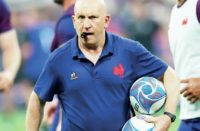 Ireland have quietly moved into third place in the world rankings without any great fireworks or fanfare. Even their Kiwi coach, Joe Schmidt, is remaining stoic. When he was asked about it he said: “Are we? Well, you don't get anything for being third in the world.”
Ireland have quietly moved into third place in the world rankings without any great fireworks or fanfare. Even their Kiwi coach, Joe Schmidt, is remaining stoic. When he was asked about it he said: “Are we? Well, you don't get anything for being third in the world.”
Schmidt added that Ireland were more interested in winning something tangible, like the Six Nations or the World Cup, than being in the runners-up positions in the world rankings.
Schmidt is one of those coaches who makes his strategy as simple as it can be, distilling a bank of data in the modern game that can be mind-blowing into something workable and successful. It seems he has quite a few of the skills required to get the key information across to the Irish players, because this autumn they have taken it on board and put it into practice.
I've heard that Schmidt is highly analytical, and that his message to the Irish team has been that if they do their jobs at the right place in the right time then they will get the results they are after.
He gave Ireland more structure and purpose to their game in winning the last Six Nations, where at times it seemed as if they were manipulating the opposition into doing what they wanted. There was more of the same this autumn, and Rhys Ruddock's try against South Africa, from a driving maul, was the result of almost everyone in the side playing their part.
Remember, too, that their wins over South Africa and Australia this autumn were achieved without two outstanding forwards in Cian Healy and Sean O'Brien.
Schmidt applies simple formulas rather overly complex ones, but they rely on core skills being exercised with precision. This may explain why Conor Murray has developed quickly into the best scrum-half in the Northern Hemisphere.
Murray's tactical kicking has been one of the highlights of this autumn series. His box-kicks travel 40 metres and hang for an eternity – and for Tommy Bowe, Robbie Henshaw, Jared Payne and Andrew Trimble it's a gift, and for opponents a nightmare.
With Jonny Sexton maturing into one of the best fly-halves in the game, Ireland have two half-back generals executing with such precision that, if their team-mates are tuned-in, it gives them a winning edge.
The reason Ireland have gone under the radar is that it's a simple game-plan very well executed – but by the Six Nations and the World Cup, they will be under much greater scrutiny.
I played in a dominant England era where we were expected to win the Five Nations for the best part of ten years, and we did ourselves justice by winning three Grand Slams in five seasons. Some critics saw our style as boring because, although we were dominant through a powerful pack, we often scored only late on after we had broken our opponents down. However, if you ask me whether I'd rather play fizzing back-line rugby and lose, or tighter winning rugby and win, I'd rather win.
As Ireland have discovered under Schmidt, if you play a simple game with everyone doing their job, it's amazing how successful it can be. If the 9 and 10 are your brains-trust, and your main executors, then the simpler it is for the rest of the team to react on cue. This is a method of coaching that implies that if a player cannot adapt then they will not be in the team for long. There's nothing wrong with that approach from a coach, because his job depends on it.
However, if you're an instinctive back then you might have a few more problems with it than a front-five forward. As a back there are more variables, and a player like Simon Zebo, who comes across as relaxed and instinctive, might find it harder to adapt to a stricter game-plan than most.
For instance, if you offload instinctively and the opposition score – as happened to Zebo against Australia – then you will be under the Schmidt spotlight. His philosophy is all about the risk-reward factor, and picking the right options while not squashing individual ambition. It was a tight-rope Schmidt walked successfully with Leinster.
However, there's nothing wrong against specific opposition, like South Africa, with the coach saying: “Boys, no offloads today” – which is clearly what Schmidt did because Ireland made no offloads against South Africa, and only seven against Australia.
Paul O'Connell is a sign of how the Irish players have adapted to Schmidt's style. O'Connell's body shape has changed – he looks leaner and lighter – and against South Africa he made 17 tackles, missing none, whereas he made only two metres as a carrier.
You can see from those stats that his job against South Africa was to make his tackles and win lineout ball, and that it was part of a kick-chase-stick South Africa on their backsides strategy. It was a plan which was dedicated to applying pressure, and it was a winning one. What I like about Kiwi coaches like Schmidt, Warren Gatland and Vern Cotter, is that they apply the fundamentals of the game. The first is fitness, the second is to keep mistakes to a minimum, and the third is to execute well and take your opportunities.
Ireland can build from here. When Schmidt went to Leinster he said he wanted to turn them into the best passing side in Europe, and on their way to two Heineken Cup titles under him they achieved that. Leinster could play it tight and gritty, or open up and play great flowing rugby.
You suspect this is the first layer of the cake from Schmidt, because if he does what he did with Leinster, by the Six Nations he will be aiming to add another layer. He is an experienced coach who knows that a simple game-plan will do well consistently, but he also knows that it usually requires more to win the big prizes.
Rob Kearney and Bowe are great runners, and Henshaw and Payne have got the moves – now we've got to see them. Ireland will start as favourites for the Six Nations, a label they have struggled with in the past – maybe under Schmidt it won't be such a burden.
*This article was first published in The Rugby Paper on November 30.


























